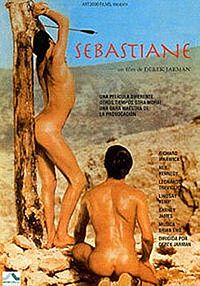Derek Jarman: Difference between revisions
No edit summary |
Jackie Sider (talk | contribs) No edit summary |
||
| (4 intermediate revisions by 3 users not shown) | |||
| Line 1: | Line 1: | ||
====Date: [[:Category: | ====Date: [[:Category:1976|1976]]==== | ||
====Region: [[:Category:Europe|Europe]]==== | |||
====Subject: [[:Category:Nudity|Nudity]], [[:Category:Sexual/Gender Orientation|Sexual/Gender Orientation]], [[:Category:Political/Economic/Social Opinion|Political/Economic/Social Opinion]]==== | |||
====Medium: [[:Category:Television|Television]], [[:Category:Film Video|Film Video]] ==== | |||
====Medium: [[:Category:Television|Television]] [[:Category:Film Video|Film Video | |||
---- | ---- | ||
[[File:derekjarman.jpeg|right|200px]] | |||
'''Artist:''' Derek Jarman | '''Artist:''' Derek Jarman | ||
'''Confronting Bodies:''' British television networks, the BBC | '''Confronting Bodies:''' British television networks, the BBC | ||
'''Dates of Action:''' 1976 - 1990 | '''Dates of Action:''' 1976 - 1990 | ||
'''Location:''' England | '''Location:''' England | ||
'''Description of Artwork:''' Jarman created numerous homosexual films from the 1970's through his death in 1994. In addition to the topic of homosexuality, the movies sometimes contained full nudity and violence. <P> | '''Description of Artwork:''' Jarman created numerous homosexual films from the 1970's through his death in 1994. In addition to the topic of homosexuality, the movies sometimes contained full nudity and violence. <P> | ||
'''The Incident:''' The first of his censored films was ''Sebastiane,'' which is about an early Christian saint. A homoerotic story emerges between two Roman soldiers and one scene includes a penis swinging into the frame. For the cinema, censors decided to project the film the wrong ratio to obscure the penis. The television rights were acquired early on, but it was never shown. <P> | |||
'''The Incident:''' The first of his censored films was | |||
'''Results of Incident:''' Eventually it was agreed to be transmitted if another penis, during an orgy scene, were blurred out. <P> | '''Results of Incident:''' Eventually it was agreed to be transmitted if another penis, during an orgy scene, were blurred out. <P> | ||
This was not the last time his films were cut by television stations. In 1978, his film | This was not the last time his films were cut by television stations. In 1978, his film ''Jubilee,'' caused an outrage over its showing violence against police. The prompted the station to place a red triangle in the corner of the screen to warn the public that a program might be offensive, but instead the triangle enticed more people to watch. <P> | ||
In 1988, a small portion of | In 1988, a small portion of ''Edward II'' was cut by the BCC. Jarman demanded that during the cut a banner saying, "Censored by the BBC" would go up, but he had no legal right to insist on this. <P> | ||
Nearly all of Jarman's works saw cuts or resistance of some sort in an attempt to de-homosexualize them. <P> | Nearly all of Jarman's works saw cuts or resistance of some sort in an attempt to de-homosexualize them. <P> | ||
'''Source:''' Censorship: A World Encyclopedia. Ed. Derek Jones. Chicago; London: Fitzroy Dearborn, 2001. | '''Source:''' Censorship: A World Encyclopedia. Ed. Derek Jones. Chicago; London: Fitzroy Dearborn, 2001. | ||
| Line 50: | Line 31: | ||
[[Category: | [[Category:1976]] | ||
[[Category: | [[Category:1970s]] | ||
[[Category:]] | [[Category:20th century]] | ||
[[Category:Europe]] | [[Category:Europe]] | ||
[[Category: | [[Category:England]] | ||
[[Category:Nudity]] | [[Category:Nudity]] | ||
| Line 72: | Line 51: | ||
[[Category:Film Video]] | [[Category:Film Video]] | ||
[[Category:]] | [[Category:Derek Jarman]] | ||
[[Category: | [[Category:For review]] | ||
__NOTOC__ | __NOTOC__ | ||
Latest revision as of 19:39, 3 February 2012
Date: 1976
Region: Europe
Subject: Nudity, Sexual/Gender Orientation, Political/Economic/Social Opinion
Medium: Television, Film Video
Artist: Derek Jarman
Confronting Bodies: British television networks, the BBC
Dates of Action: 1976 - 1990
Location: England
Description of Artwork: Jarman created numerous homosexual films from the 1970's through his death in 1994. In addition to the topic of homosexuality, the movies sometimes contained full nudity and violence.
The Incident: The first of his censored films was Sebastiane, which is about an early Christian saint. A homoerotic story emerges between two Roman soldiers and one scene includes a penis swinging into the frame. For the cinema, censors decided to project the film the wrong ratio to obscure the penis. The television rights were acquired early on, but it was never shown.
Results of Incident: Eventually it was agreed to be transmitted if another penis, during an orgy scene, were blurred out.
This was not the last time his films were cut by television stations. In 1978, his film Jubilee, caused an outrage over its showing violence against police. The prompted the station to place a red triangle in the corner of the screen to warn the public that a program might be offensive, but instead the triangle enticed more people to watch.
In 1988, a small portion of Edward II was cut by the BCC. Jarman demanded that during the cut a banner saying, "Censored by the BBC" would go up, but he had no legal right to insist on this.
Nearly all of Jarman's works saw cuts or resistance of some sort in an attempt to de-homosexualize them.
Source: Censorship: A World Encyclopedia. Ed. Derek Jones. Chicago; London: Fitzroy Dearborn, 2001.
